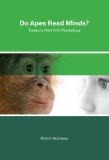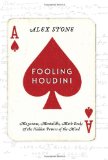July 30, 2012

The Foundations of Cognitive Archaeology by Marc A. Abramiuk (MIT Press, 2012)
(amazon.co.uk)
Book description from the publisher:
In The Foundations of Cognitive Archaeology, Marc Abramiuk proposes a multidisciplinary basis for the study of the mind in the past, arguing that archaeology and the cognitive sciences have much to offer one another. Abramiuk draws on relevant topics from philosophy, biological anthropology, cognitive psychology, cognitive anthropology, and archaeology to establish theoretically founded and empirically substantiated principles of a discipline that integrates different approaches to mind-related archaeological research.
Abramiuk discusses the two ways that archaeologists have traditionally viewed the human mind: as a universal or as a relative interface with the environment. He argues that neither view by itself can satisfactorily serve as a basis for gleaning insight into all aspects of the mind in the past and, therefore, the mind is more appropriately studied using multiple approaches. He explains the rationale for using these approaches in mind-related archaeological research, reviewing the literature in both cognitive psychology and cognitive anthropology on human memory, perception, and reasoning. Drawing on archaeological and genetic evidence, Abramiuk investigates the evolution of the mind through the Upper Paleolithic era–when the ancient mind became functionally comparable to the modern human mind. Finally, Abramiuk offers a model for the establishment of a discipline dealing with the study of the mind in the past that integrates all the approaches discussed.
Google Books preview:
Comments (0)
- cognitive science,culture,human evolution,new books
July 29, 2012

Do Apes Read Minds?: Toward a New Folk Psychology by Kristin Andrews (MIT Press, 2012)
(amazon.co.uk)
Book description from the publisher:
By adulthood, most of us have become experts in human behavior, able to make sense of the myriad behaviors we find in environments ranging from the family home to the local mall and beyond. In philosophy of mind, our understanding of others has been largely explained in terms of knowing others’ beliefs and desires; describing others’ behavior in these terms is the core of what is known as folk psychology. In Do Apes Read Minds? Kristin Andrews challenges this view of folk psychology, arguing that we don’t consider others’ beliefs and desires when predicting most quotidian behavior, and that our explanations in these terms are often inaccurate or unhelpful. Rather than mindreading, or understanding others as receptacles for propositional attitudes, Andrews claims that folk psychologists see others first as whole persons with traits, emotions, and social relations. Drawing on research in developmental psychology, social psychology, and animal cognition, Andrews argues for a pluralistic folk psychology that employs different kinds of practices (including prediction, explanation, and justification) and different kinds of cognitive tools (including personality trait attribution, stereotype activation, inductive reasoning about past behavior, and generalization from self) that are involved in our folk psychological practices. According to this understanding of folk psychology–which does not require the sophisticated cognitive machinery of second-order metacognition associated with having a theory of mind–animals (including the other great apes) may be folk psychologists, too.
Google Books preview:
See also: Kristin Andrews and Robert Lurz on animals and mindreading at Philosophy TV, author’s articles at PhilPapers
Comments (0)
- cognitive science,new books,philosophy of mind
July 25, 2012

Another Day in the Monkey’s Brain by Ralph Mitchell Siegel, with a foreword by Oliver Sacks (Oxford University Press, USA, 2012)
(amazon.co.uk – Sep 2012)
Book description from the publisher:
ANOTHER DAY IN THE MONKEY’S BRAIN charts a neuroscientist’s journey to understand the central mysteries of consciousness. Dr. Siegel began his career in the neurophysiology of vision in the 1980s, just when the field was coming into focus with the advent of new computing and imaging technologies. As a pioneer in the technique of mesoscopic imaging, he worked with some of the giants in vision science: Torsten Wiesel, Francis Crick, Tom Albright and many others. With insight and clarity, he shows how science is built on such relationships. Along the way, he gives a vivid sense of the abundant passion and creativity that drive scientists in their pursuit of understanding. From monkey to man, Dr. Siegel finds the beauty in the scientific discovery of self in mind and brain.
Google Books preview:
Comments (0)
- cognitive science,consciousness,new books
June 30, 2012

Thinking without Thinking in the Victorian Novel by Vanessa L. Ryan (Johns Hopkins University Press, 2012)
(amazon.co.uk)
Product description from the publisher:
In Thinking without Thinking in the Victorian Novel, Vanessa L. Ryan demonstrates how both the form and the experience of reading novels played an important role in ongoing debates about the nature of consciousness during the Victorian era.
Revolutionary developments in science during the mid- and late nineteenth century—including the discoveries and writings of Herbert Spencer, William Carpenter, and George Henry Lewes—had a vital impact on fiction writers of the time. Wilkie Collins, George Eliot, George Meredith, and Henry James read contributions in what we now call cognitive science that asked, “what is the mind?” These Victorian fiction writers took a crucial step, asking how we experience our minds, how that experience relates to our behavior and questions of responsibility, how we can gain control over our mental reflexes, and finally how fiction plays a special role in understanding and training our minds.
Victorian fiction writers focus not only on the question of how the mind works but also on how it seems to work and how we ought to make it work. Ryan shows how the novelistic emphasis on dynamic processes and functions—on the activity of the mind, rather than its structure or essence—can also be seen in some of the most exciting and comprehensive scientific revisions of the understanding of “thinking” in the Victorian period. This book studies the way in which the mind in the nineteenth-century view is embedded not just in the body but also in behavior, in social structures, and finally in fiction.
Comments (0)
- cognitive science,consciousness,culture,fiction,new books
June 19, 2012

One of Amazon’s Best Books of the Month for June 2012: Fooling Houdini: Magicians, Mentalists, Math Geeks, and the Hidden Powers of the Mind by Alex Stone (Harper, 2012)
(kindle ed.), (amazon.co.uk – 5 July)
Book description from the publisher:
When Alex Stone was five years old, his father bought him a magic kit—a gift that would spark a lifelong love. Years later, while living in New York City, he discovered a vibrant underground magic scene exploding with creativity and innovation and populated by a fascinating cast of characters: from his gruff mentor, who holds court in the back of a rundown pizza shop, to one of the world’s greatest card cheats, who also happens to be blind. Captivated, he plunged headlong into this mysterious world, eventually competing at the Magic Olympics and training with great magicians around the globe to perfect his craft.
From the back rooms of New York City’s century-old magic societies to cutting-edge psychology labs; three-card monte on Canal Street to glossy Las Vegas casinos; Fooling Houdini recounts Stone’s quest to join the ranks of master magicians. As he navigates this quirky and occasionally hilarious subculture, Stone pulls back the curtain on a community shrouded in secrecy, fueled by obsession and brilliance, and organized around a single overriding need: to prove one’s worth by deceiving others.
But his journey is more than a tale of tricks, gigs, and geeks. In trying to understand how expert magicians manipulate our minds to create their astonishing illusions, Stone uncovers a wealth of insight into human nature and the nature of perception. Every turn leads to questions about how the mind perceives the world and processes everyday experiences. By investigating some of the lesser-known corners of psychology, neuroscience, physics, history, and even crime, all through the lens of trickery and illusion, Fooling Houdini arrives at a host of startling revelations about how the mind works—and why, sometimes, it doesn’t.
See also: Book website
Comments (0)
- cognitive science,psychology







